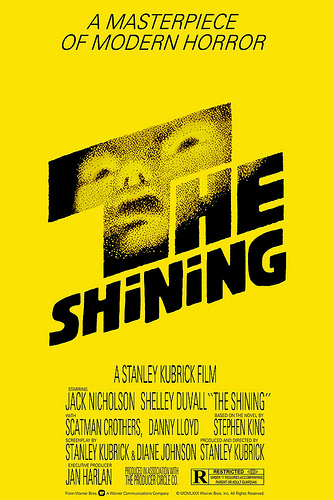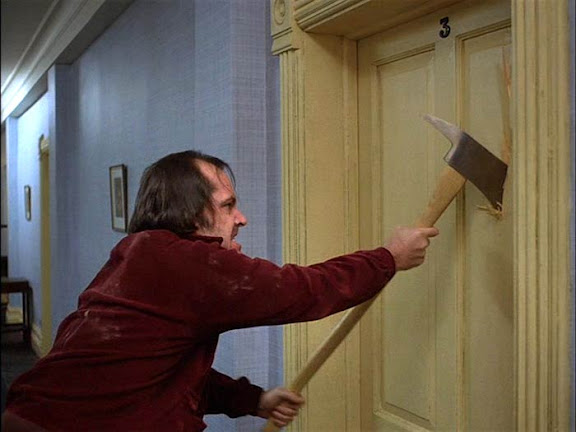 The Shining
The Shining
1980; directed by Stanley Kubrick; screenplay by Stanley Kubrick and Diane Johnson, from the novel by Stephen King
Jeremy: The Shining is as seminal as films come. Stanley Kubrick’s loose adaptation of the Stephen King novel of the same name has worked its way into the public consciousness to a degree matched by very few films. The imagery, the performances, the location, the soundtrack that was endlessly copied by other entries in the genre; The Shining is truly a landmark horror film. It holds up to both the ideals of great horror and to critical consumption alike. This is not a film to be watched casually or one you can easily walk away from. Kubrick’s evocation of environment is so potent that for 142 minutes the viewer is not simply a passive bystander, but a prisoner of the Overlook Hotel and an active observer of the horrific events.
What is the real horror of The Shining? Is it the malicious ghosts that inhabit The Overlook and torment Jack Torrance until he turns on his family like a rabid dog? Or is it watching the young boy, Danny, caught up in what is essentially an abusive home and the psychological damage that is inflicted upon him? Kubrick never attempted to make a simple ghost story, but a metaphorical document of the effects of violence on a family. It’s hard to shake the notion that Danny is more than just a creation, he’s emblematic of the countless kids who grow up with domestic abuse. When the credits roll the ghosts of The Overlook disappear but the images of a comatose Danny and of the two bloody girls refuse to go away.
 Allen: Of all the times I’ve seen Stanley Kubrick’s The Shining, I can’t help but think that its main accomplishment is presenting a kind of malevolence to the audience without ever having to show anything on screen. You can never take a Kubrick film at face value, there’s always something bubbling just beneath the surface, a kind of danger that you have to peer a little closer to see.
Allen: Of all the times I’ve seen Stanley Kubrick’s The Shining, I can’t help but think that its main accomplishment is presenting a kind of malevolence to the audience without ever having to show anything on screen. You can never take a Kubrick film at face value, there’s always something bubbling just beneath the surface, a kind of danger that you have to peer a little closer to see.
The thing about this film is that, although we have an idea of what’s happening, we can never be exactly sure of what it is. Is the Overlook Hotel really overrun by ghosts, or is it a result of Jack Torrance going crazy? What exactly is “The Shining”, why does it seem to affect Jack’s son, Danny, and how is it related to what is happening in the hotel? What is Jack’s relationship to the hotel, has he been there before, and why doesn’t he realize this? Who are those twin girls? Why does blood come pouring out of the elevator, and what exactly is that guy doing with that bear? Perhaps the King novel answers these questions, but what Kubrick did here was use our fear of the unknown and amp it to a much higher, artistic level, etching its unpredictability and menace in to our minds. A classic horror film that should be seen again and again.
 Ed: Another example of expectation being the most frightening thing. Armed with nothing more than a kid on a bigwheel, and a looooong set of hallways, Kubrick is able to make us feel that something horrible is coming. We don’t know what, but the anticipation is killer. And this movie has it all: creepy kids (“Redrum”), a bloody skinless woman, “All work and no play makes Jack a dull boy”, ominous twins, Olive Oyl screaming for half the movie (Shelley Duvall must have gone hoarse on set), and Scatman Crothers showing up just to get killed. As I understand it, this movie is quite a bit different than the book it comes from. But it is still one of the best movies made from a Stephen King novel.
Ed: Another example of expectation being the most frightening thing. Armed with nothing more than a kid on a bigwheel, and a looooong set of hallways, Kubrick is able to make us feel that something horrible is coming. We don’t know what, but the anticipation is killer. And this movie has it all: creepy kids (“Redrum”), a bloody skinless woman, “All work and no play makes Jack a dull boy”, ominous twins, Olive Oyl screaming for half the movie (Shelley Duvall must have gone hoarse on set), and Scatman Crothers showing up just to get killed. As I understand it, this movie is quite a bit different than the book it comes from. But it is still one of the best movies made from a Stephen King novel.
Mark: I am a fan of Kubrick. He is a master at crafting his pictures and The Shining is no exception: it’s a film that is as elegant as it is brutal. Watch the elevator scene: what more is there to say?
Team Rankings:
Jeremy – #1
Chad – #1
Spencer – #1
Allen – #3
Mark – #4
Ed – #16






Comments